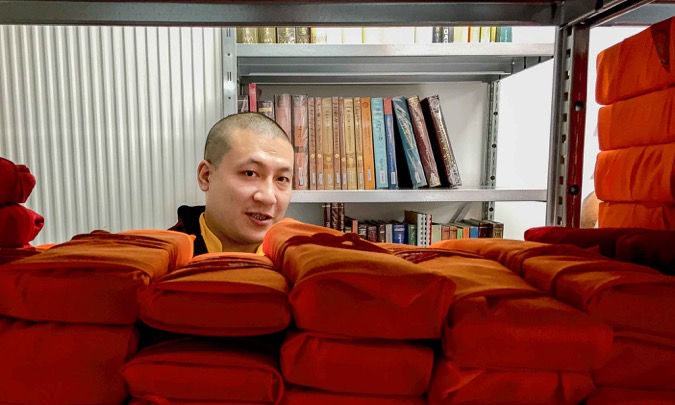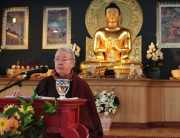Dhagpo’s fortieth anniversary is also the birth of a library. I won’t recount in this article the history of the library that, today, is open to all and houses several thousand works; I’ll let you click here if you’d like to discover it.
What I’d like to talk with you about, on the other hand, is the importance of such a place within our community and what it offers to humanity. Being a volunteer librarian at Dhagpo, I often get asked this question : what is the library for ? Here, an attempt at a response…
Reading to Build One’s Freedom
Everything changes when we read. Reading forces us to learn new words, to think new thoughts, to slow down, quite simply. Words are more important than ever today. In the era of written communication, we navigate the world with the words with type into our search bars or on our smart phones. Literacy is an essential part of the education of each child for the future of humanity. We need to read and write; we need well-balanced human beings, capable of understanding what they read, of grasping the nuances and of making themselves understood in their own turn. As Karmapa Thaye Dorje said:
“Literacy is crucial to building understanding in our world. Becoming literate – from basic reading and writing skills, to developing a broad understanding of the issues we seek to address – is important for all of us. Without literacy we can fall into misunderstandings and judgements. Small problems like family problems. Or problems on a larger scale like countries and nations.”
If we don’t read, the world becomes impoverished and the whole of education declines. A book is an access to education and information. Each library offers this free access and this information has value. In the Buddhist context, our own, the value in question is inner wealth: the acquisition of knowledge that leads to the development of compassion and wisdom.
Transmitting and Inheriting : The Book as the Memory of the Lineage
In our Western context, those Buddhist-from-birth are a rare kind. We become Buddhist, step-by-step, through developing our own understanding of the Buddha’s message and applying it. The Buddha lives more than 2,500 years ago; how did his message and his method reach us? Thanks to written works: instructions of the teachings meticulously handwritten by the first disciples of the Enlightened One. These texts were then commented, translated, published – in other words, rendered accessible and transmitted.
For most of us, the path began with reading. The application of the path is also supported by texts. As Christian Jacob said:
“Knowledge comes into its own solely by entering into a process of circulation, of exchange, of communication and transmission.”
The book is the vector. In our own Buddhist context, the Karma Kagyü lineage of Tibetan Buddhism, the book is not an object of veneration, but a tool of understanding and a reminder on the path. The practitioner commits to a tradition, applies and deepens the understanding of the master’s teaching in order to absorb this heritage up until the point that it becomes his own. Transmission and heritage are interdependent.
The Tibetan term kagyü signifies “transmission of the word”. Essentially, it is the human who transmits and the book which plays the supporting role of memory, the condition sine qua non of the transmission. In 2010, when Karmapa received the transmission of the entirety of the Damnakadzö at Kundreul Ling, during two months, the 13 volumes of the text compiled by Jamgön Kongtrül Lodrö Thaye were sent from Dhagpo’s library, where they are preserved and available for consultation.
The Dhagpo Kagyu Library : A Place Beyond Time
How can one know the Buddha and feel oneself practically present with him in his own time without reading Old Path, White Clouds by Thich Nhat Hanh (in Frenchh: Sur les traces de Siddharta)? The library offers the magic of this dialogue with beings from another century. Books allows us to learn lessons from those who are no longer here. Don’t we forget, all too often, that a book, once in a while, can change the course of a whole life ?
From its opening in June 2013, more than 500 works have been given to the Dhagpo Kagyu library – general Buddhist works or technical publications from Harvard University, books in English, French, and Russian. It seems that the library touches, in the most profound part of our being, the responsibility to preserve a heritage and to make its wisdom available.
During my days behind the desk, I have at times seen locals on tiptoe, hesitating to enter, curious children, serious researchers, or writers working on their next publication. All different, and meanwhile, all exactly alike: readers. I invite this one to sit down with a magazine and benefit from the calm; I place in the hands of another a few volumes from the manga Buddha; I guide the tibetophiles into the stacks, or I seek out useful materials for the errant writer. Reading for curiosity, for pleasure, for learning, or for work; whatever the case, a moment suspended in the universe, tucked in the most intimate part of our being.
So come and read and send your children to the library, for otherwise, as Neil Gaiman says,
“You are silencing the voices of the past and you are damaging the future.”
Bibliography (in French)
- JACOB Christian, “Le cercle et la lignée”, in Lieux de savoirs, Espaces et communautés, Albin Michel, Paris, 2007.
- TEZUKA Osamu, Bouddha, Tonkam, Paris, 1998.
- THICH NHAT HANH, Sur les traces de Siddhartha, JC Lattès, Paris, 1996.







Leave A Comment